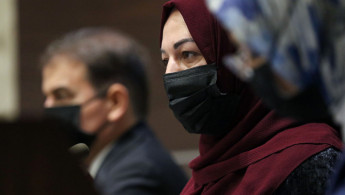Iraq's top court postpones hearing on legality of Iraqi Kurdistan's parliament extension
Iraq's Federal Supreme Court today adjourned until next week its hearing on the "constitutionality" of extending the Iraqi Kurdistan region's parliament, government and presidency to December, as representatives of the defendants did not attend the session.
The Kurdistan parliament of the semi-autonomous region of northern Iraq unanimously passed Law 12 of 2022 on 9 October, which extends the mandates of the parliament, the Kurdistan Regional Government (KRG) and the Kurdistan region's presidency until late 2023.
The former speaker of the Iraqi Kurdistan region parliament, Yousuf Mohammed Sadiq, the president of the New Generation Movement (NGM) opposition party Shaswar Abulwahid, NGM's lawmaker in the Iraqi parliament Sirwa Abdulwahid and NGM's MP in the Kurdish assembly Kawa Abdulqadir have raised separate legal cases against the speaker of the Kurdistan region's parliament, Rewaz Fayaq, and the president of Kurdistan region Nechirvan Barzani.
The plaintiffs argue that the extensions are contrary to articles of the Iraqi constitution, the principles of democracy and holding fair elections every four years according to the region's election law.
"The hearing has been postponed until 7 February because the representatives of the defendant, the speaker of the Kurdistan region's parliament in addition to her position, did not attend the hearing due to bad weather conditions, and for the purpose that the court to complete its reviews of the case," the court said in a statement on Tuesday.
The two ruling Kurdish parties, the Kurdistan Democratic Party (KDP) and the Patriotic Union of Kurdistan (PUK), backed by several lawmakers from the ruling Change Movement, the minorities and other smaller parties extended the Kurdish parliament's term after a general election scheduled for 1 October was postponed. The delay was due to disagreements among the region's major political parties on vital issues such as amendments to the election law, appointments for the region's electoral commission and how minorities are represented.
Sirwa Abdulwahid said in a tweet that the court's next hearing will be via a "public session" without clarifying further.
The New Arab contacted both Sirwa Abdulwahid and Sadiq, but they were not immediately available to comment. TNA also contacted the media department of the Kurdistan parliament, but calls were not answered.
المحكمة الاتحادية أجَّلت جلستها المتعلقة بالدعوى التي قدَّمناها بخصوص عدم دستورية قرار برلمان الإقليم تمديد فترته الحالية.
— Srwa Abdulwahid. سروه عبدالواحد (@srwa_qadir) January 31, 2023
الجلسة المقبلة ستكون "علنيةً" في السابع من شباط القادم. pic.twitter.com/w7MealqnEA
"The three legislature, executive and presidential authorities in the Kurdistan region have lost legitimacy from 6 November, since their terms have expired. Thus, extending their mandates are illegitimate and contrary to the principles of democracy, articles of the Iraqi constitution that the people of Kurdistan have also voted for it," Sadiq previously told TNA last November.
The Kurdistan region held its last general elections in September 2018. The election witnessed a low turnout of 57% and was marred by alleged widespread voter fraud by KDP and PUK. After the elections, the parliament voted to trust the KRG ninth cabinet headed by PM Masrour Barzani from the KDP and then elected Nechirvan Barzani, also from the KDP, as the region's president.
The White House Coordinator for the Middle East and North Africa, Brett McGurk, recently visited the region and reportedly urged the Kurdish authorities to deal with their internal issues and quickly hold fresh general elections.
The Kurdistan Parliament and the three ruling parties previously claimed that they wanted to use the extension to discuss a draft for a long-sought constitution for the region.





 Follow the Middle East's top stories in English at The New Arab on Google News
Follow the Middle East's top stories in English at The New Arab on Google News


